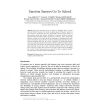605 search results - page 25 / 121 » To Tutor or Not to Tutor: That is the Question |
AIED
2009
Springer
14 years 2 months ago
2009
Springer
This paper describes the use of sensors in intelligent tutors to detect students' affective states and to embed emotional support. Using four sensors in two classroom experime...
ITS
2010
Springer
14 years 14 days ago
2010
Springer
We investigate how positive, neutral and negative feedback responses from an Intelligent Tutoring System (ITS) influences learners‟ affect and physiology. AutoTutor, an ITS with ...
AIED
2009
Springer
14 years 10 days ago
2009
Springer
We explored the possibility of predicting learners’ affective states (boredom, flow/engagement, confusion, and frustration) by monitoring variations in the cohesiveness of tutori...
FLAIRS
2007
13 years 10 months ago
2007
The difficulty of domain knowledge acquisition is one of the most sensible challenges of intelligent tutoring systems. Relying on domain experts and building domain models from sc...
FLAIRS
2008
13 years 10 months ago
2008
Truly generic and reusable intelligent tutoring software architectures have remained elusive. As part of our effort to develop tutoring systems for simulations of ill-defined doma...

